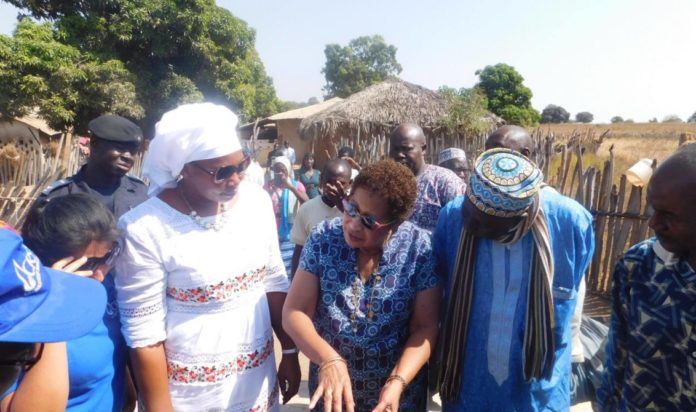Ambassador of the United States of America to The Gambia Patricia Alsup visited Jarra Jasong (Lower River Region) today to view progress on a $50,000 (GMD 2.3M) USG grant to assist victims of the August 2017 flood.
Shortly after the September 11 flooding, a rapid assessment team from the Gambian National Disaster Management Agency and CRS discovered that hundreds of homes and farms had been destroyed, affecting 20,000 individuals. In addition, multiple pit latrines and water points had over-flowed, prompting concerns about potential water-borne disease outbreaks. The project, implemented by Catholic Relief Services (CRS), includes capacity building for communities so that they can effectively monitor, operate, and sustain the facilities provided with U.S. government funding and CRS expertise.

CRS added $25,000 from its private funding to USAID’s $50,000 and has been working diligently over the past two months to restore potable water access and sanitation facilities to more than 3,600 households. CRS will continue to partner with LRR and CRR north communities to map wells and latrines that were affected by the flooding, and then work with the private sector to clean and restore those facilities. The grant also funds distribution of water purifying tablets and educates families on how to use the tablets, so that families can access clean water even after the life of the project. After the wells and latrines have been restored, CRS will work with the Department of Water Resources to conduct ongoing testing to make sure the water quality remains safe to drink. The project will benefit approximately 30,000 people in the two regions.
During her remarks in Jarra Jasong, Ambassador Alsup said, “The U.S. government’s partnership with CRS is illustrative of the type of work we do with partner countries, the private sector, and other relevant stakeholders to improve water and sanitation around the world. And we recognize that here in the “New” Gambia, safe drinking water and sanitation facilities are the foundation for building healthy communities throughout the country.”




